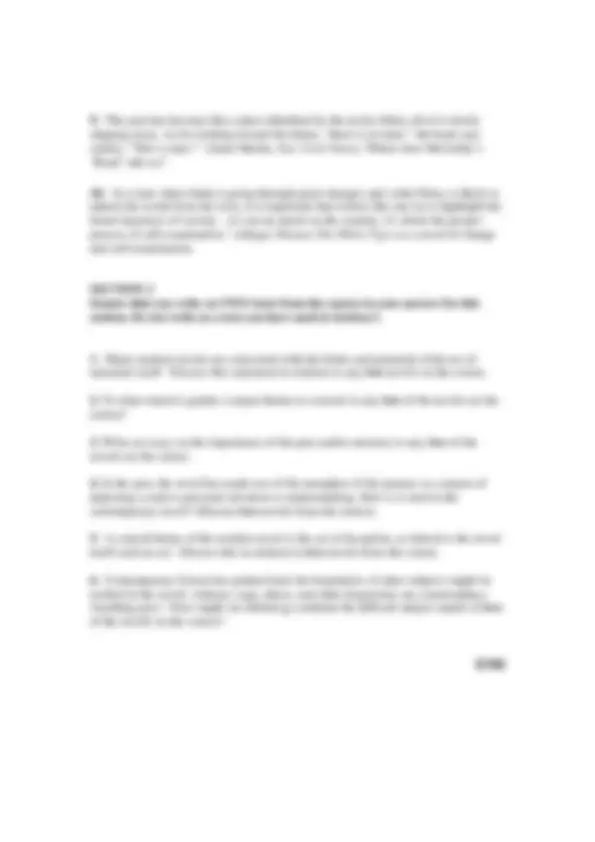



Study with the several resources on Docsity

Earn points by helping other students or get them with a premium plan


Prepare for your exams
Study with the several resources on Docsity

Earn points to download
Earn points by helping other students or get them with a premium plan
Community
Ask the community for help and clear up your study doubts
Discover the best universities in your country according to Docsity users
Free resources
Download our free guides on studying techniques, anxiety management strategies, and thesis advice from Docsity tutors
Information about the examinations for the contemporary literature module during the academic year 2011-2012. It includes the exam codes, duration, number of pages, and instructions. The document also lists the novels and poems to be covered, as well as the external and internal examiners. Students are required to answer one question from each section and must not use previously written answers from mid-term exams.
Typology: Exams
1 / 3

This page cannot be seen from the preview
Don't miss anything!


Exam Code(s) 3BA1, 4BA4, 4BCW1, 4BFS1, 4BHR1, 4BIS1, 4BTP1, 4BWM
Exam(s) 3 rd^ Arts, 4 th^ Arts
Module Code(s) ENG Module(s) Contemporary Literature
Paper No. I
External Examiner(s) Professor S. Matterson Professor H. Phillips Internal Examiner(s) Professor S. Ryder *Dr Richard Pearson Dr Sinead Mooney
No. of Pages 2 Discipline(s) English
Requirements None
You must answer ONE question from EACH section. In neither section should you answer on the text you have already written on for your mid-term.
SECTION 1 You may confine your answer in this section to ONE novel from the course.
1. ‘The narrative of Possession is an admonition to the literary academic. Roland explains to Maud that he works on Ash's poems because they were "what stayed alive, when I'd been taught and examined everything else". "That's it," she replies. "What could survive our education." Roland and Maud [...] show - empirically, irrefutably - that the most sophisticated academic analyses of LaMotte's and Ash's work have been wrong. Literary academics, it seems, invite satire, for they bring most ingenuity to what they cannot know’ (John Mullan, Guardian 20 June 2009). Write an essay on the representation of literary criticism in AS Byatt’s Possession. 2. A reviewer of Hilary Mantel’s Beyond Black notes the ‘dreadful blandness of 21st^ - century English life: a society that in this novel's satiric vision appears to have become a kingdom of euphemism, a place whose organizing principle is the denial of the rude facts of life and death’ ( New York Times 15 May 2005). Do you agree with this estimate of the novel’s target? 3. Angela Carter ‘invites her readers to exercise both their sense of fantasy [...] and their objective critical faculties simultaneously’ (Brian Finney, ‘Tall Tales and Brief Lives’). Discuss this statement in relation to Nights at the Circus. 4. ‘The central incidents in both narrative settings of Disgrace are acts of sexual violation, but notably, in each case, the experience of the violated body is absent, hidden from the reader.’ (Graham). Discuss. 5. According to Harte, The Gathering charts ‘the devastating chronic effect of the trauma of child sexual abuse on identity, agency, and relationships in an Irish context.’ Discuss. 6. ‘The exploration of the consequences that ensue after one life-changing event is a common feature in McEwan’s work’ (Julie Ellam). Discuss Atonement as a novel of ‘consequences’. 7. John M. Harrison remarks in a review of Never Let Me Go : ‘Inevitably, it being set in an alternate Britain, in an alternate 1990s, this novel will be described as science fiction. But there’s no science here.’ Discuss Ishiguro’s novel as either a meditation on science, or a meditation on what it is to be human. 8. ‘[Felicia’s] encounter with the psychopath Hilditch brings the question of home- founding to the fore and reveals the fantasy and distortions of memory which underpin all constructions of home’ (Conn Holohan). Discuss in relation to Felicia’s Journey.
PTO